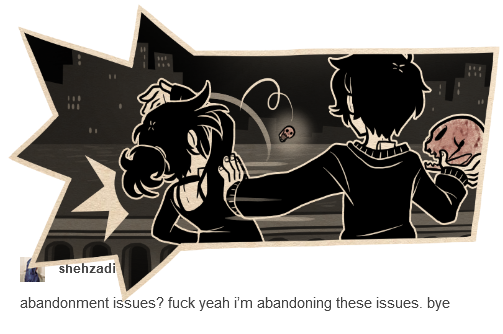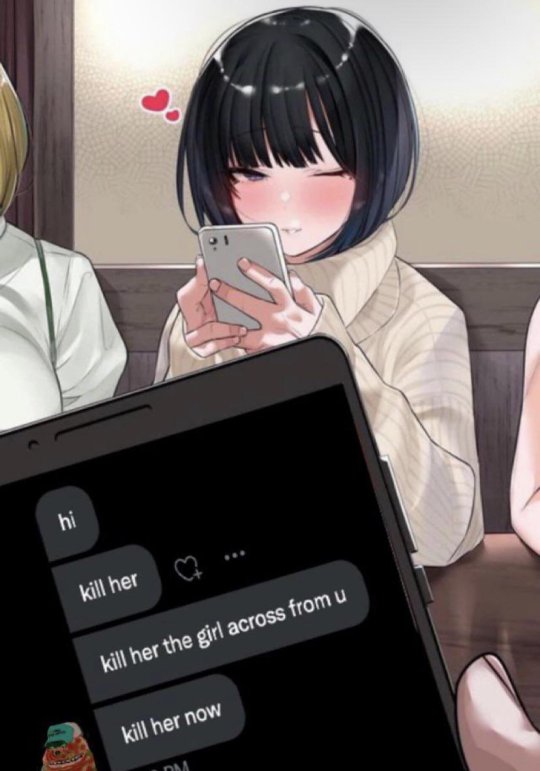Text
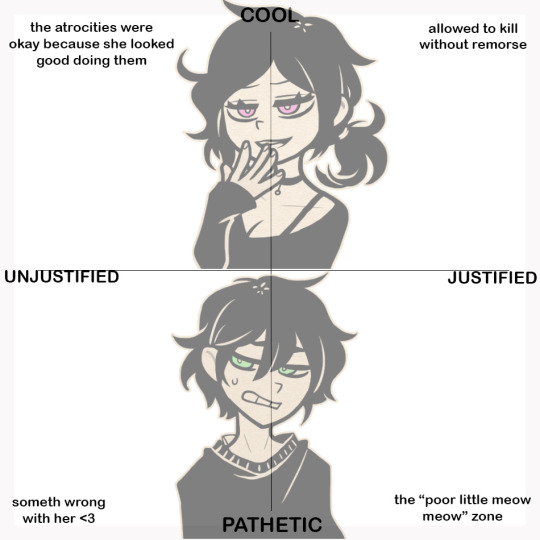
I will not be accepting criticism.
106 notes
·
View notes
Note
i just wanted to say thank you so much for writing such wonderful essays and loving ashley so much, it is so refreshing and it always makes me smile when you post, thank you!!

Someone's gotta love this character as much as me.
(i'm not gonna start crying over an anonymous ask showing appreciation, we are not doing that today)
16 notes
·
View notes
Text
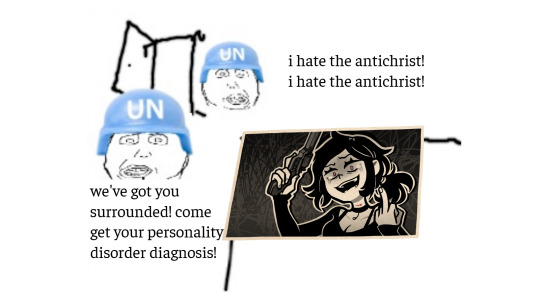
49 notes
·
View notes
Text
>Yes Ashley was a natural born sociopath with sadistic tendencies
every time i see people say this shit i can feel a tumor growing in my brain
What I enjoyed about The Coffin Of Andy and Leyley isn’t just the darker storyline and the concept of “how do I make those step out of their comfort zone in horror that” but also by the thematic elements of nature vs nurture when it came to the siblings as a characters. Yes Ashley was a natural born sociopath with sadistic tendencies and all but then you gotta remember that that Mrs.Graves had every opportunity to get her daughter help and psychological help but then we gotta remember she pretty much never wanted to do anything with her youngest with a 10 ft pole resulting in her oldest Andrew at 7 years old having to step up emotionally as being the mom and dad to Ashley resulting in her having a deep rooted attachment to her brother and her brother the same thing. I often saw the toxic sibling codependency to be an interesting darker theme explored but never saw how nature vs nurture is brought up especially when it came to Andrew and Ashley but no excuse for her atrocities and sadistic tendencies as a morally bankrupt individual or a “tar soul”
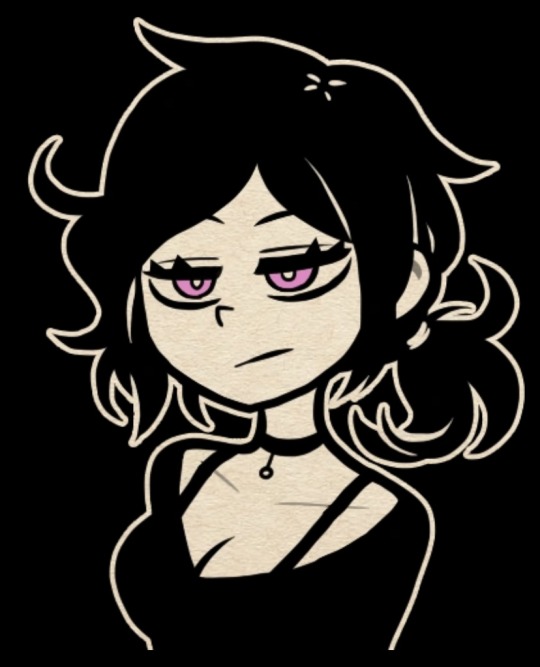
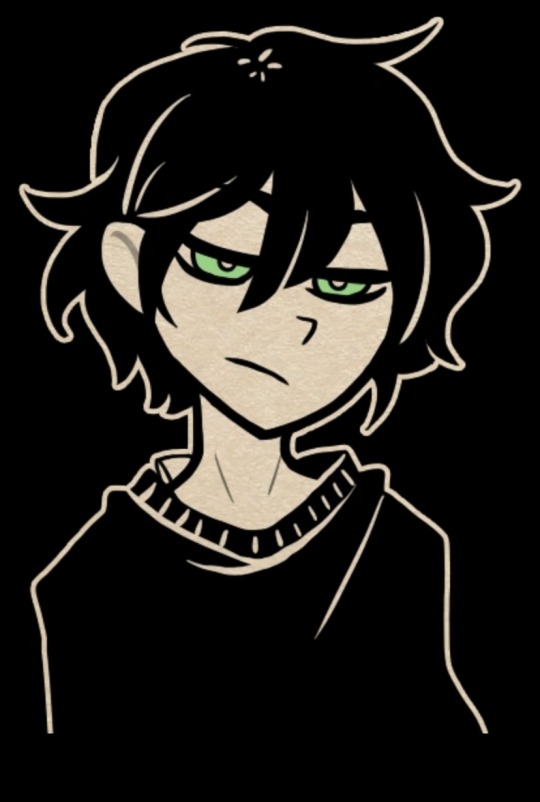
Loving the game and psychological aspects it has as a horror game alongside that of supernatural occultism.
69 notes
·
View notes
Text
I appreciate that someone managed to make such a rebuttal to my essay but there's a lot to go over here. I'll start by going over the silly semantic stuff because I am way too (clinically) autistic to not throw dialectical hands over definitions. I hope Wittgenstein is smiling down upon me.
>Nihilism, in this paragraph, is being equated to the existence of karma. The idea that if you take immoral actions, you will be punished for it by the world. This is, first of all, demonstrably untrue, and second of all, completely unrelated to nihilism. Nihilism is a moral philosophy suggesting that there are, in fact, no morals. A nihilistic narrative would be completely unconcerned with the morality of its characters, and therefore wouldn't even feel the need to demonstrate that terrible actions can be justified. By implying that the narrative is making moral arguments for the things Andrew and Ashley do, such as the first instance of cannibalism being necessary for survival, you're disproving the idea that it's nihilist in nature.
No. I'm not saying it's karma. I'm saying that, within the context of the story, since there are no moral consequences for their actions (i.e., they are never punished by anyone other than themselves), there is no reason to believe that the story is taking any hard moral positions. The story is not making it self-evident that their "bad" actions are "bad" by portraying them as necessary at almost every turn, but the necessity of these "bad" actions does gradually decrease as the story goes on, culminating in an action that's not justified or required outside of its thematic importance (eating their parents), and showing actions that are pretty much impossible to justify* in the future visions of both endings.
*I don't mean to imply that sibling incest ever needs justification tho, but if you're really cucked that hard by Christian morality then there is literally never any justification for it.
Basically, the story is showing us that morality is frankly irrelevant by never levying any real consequences upon the characters, which is nihilistic in the "rejecting the idea morality has any inherent essence" sense. If the story placed any value on morality, or was making any moral claims, surely it'd make the characters suffer and not show strong signs of improvement (in Burial, at least), right?
Or, to put it simply, through lacking consequences and showing an improvement in the character's circumstances, or a degeneration in said circumstances that is solely predicated on their relationship with each other, the story is intentionally lacking a true moral position. This is important because it means the story is not portraying any side as obviously wrong, and that you can't take any preconceptions for granted.
Or to put it even more simply:
By thinking in terms of right or wrong, you are compromising your own understanding of the game. You are not analyzing the game on its own terms, in its own words, or on its own merits.
>I see this attitude a lot in fandoms for fucked up characters, where people feel the need to excuse the actions of a bad person before they can appreciate them as characters, or identify with them as people. I think this is misguided.
This is not what I'm doing. I'm trying to get people deep into the headspace of the characters so they can understand their actions outside of a good/evil dichotomy, which I think is crucial to understanding what the game is trying to do. While my essay is not satirical, it is deliberately inflammatory (the "you frankly have some issues with women you need to work out." quip should've been a dead giveaway for this), and I couched it so hard precisely because I am fully aware that it is a ridiculous position to take.
While I am not going to claim that "joke's on them, I was only pretending to be retarded!", I will say that this essay was written to convey the same kinds of arguments that people use to portray Andrew as some innocent victim of Ashley's manipulations, and the misogynistic nature of that reading is why I brought up gender so much in this essay. My reading of the choking scene is me using the exact same kinds of mental gymnastics that people use for Andrew, and I feel as though I (indirectly) rebuked this reading in my next essay by making it more about Andrew establishing boundaries in a heated moment.
I thought I was making this clear by stating several times that my arguments were loose or weak, but I guess I wasn't clear enough?
Sometimes it feels like people aren't actually engaging with what I'm trying to say, like that time someone tried to rebuke my "Ashley doesn't have BPD!" essay by pointing out factual inaccuracies in my interpretation of the symptoms Ashley expresses when I basically said halfway through that essay that I was just using that to filter out people who aren't willing or able to engage with the actual point I was about to make.
(Like yeah no fucking shit she expresses strong BPD symptoms, I'm just telling armchair psychbros to go fuck themselves and that they can't analyze media worth shit but finding representation in said characters is fine and valid.)
I mean, don't get me wrong, I still don't believe she did anything wrong, but I also don't believe Andrew did anything wrong, and it's less because I think their actions are justified and more because I think none of their actions actually need justification. They falter in how they treat each other, sure, but the world and everyone** in their lives deserve everything they inflict upon it and nobody has proven to me otherwise.
Basically, Ashley Graves is an egoist icon.
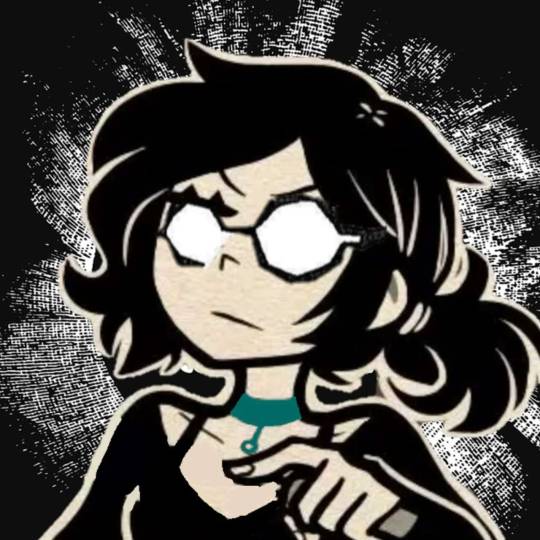
**with the exception of Julia and Nina, unless my crackpot delusional theories are correct.
Ashley Literally Did Nothing Wrong, Fuck You, Fight Me
Alt title: Ashley Graves: The most convenient scapegoat in the world
I'm going to espouse a take here that will no doubt be controversial, as you can tell by the title. This is a take I've created from my hollistic understanding of the events of the game, and isn't dependent on any one single point I make in this essay. Because of that, I want you to read it with an open mind; if you hyperfocus on one or two smaller details I might've gotten wrong or are fallaciously interpretated, and either use that to discount the whole essay or go into the comment section and immediately try to debunk my interpretation of that event, that'll make it obvious to me that you're not trying to seriously engage with the core of what I'm trying to say. Because unless quite literally everything I've said here is wrong, I feel confident in saying this:
Ashley Graves did nothing wrong.
Moreover, I think Ashley is on the level of people like Rossiu, Shinji Ikari, and Skylar White as far as people who are mistreated by their fandoms goes.
At first this was going to be an essay about how I don't think the demons are evil, using textual and thematic evidence to show that they're just part of a system that deals mostly fairly with humans and doesn't have any nefarious plans, or at least nefarious plans that stand to fuck anyone over. But then I realized that, goodness gracious, that is boring as shit to write! But I looked at what I had written already and realized that I could write something else with it: something better. I could sum up a lot of the points made in my prior essays and elaborate upon them in much more detail, showing why I think certain themes are obviously present within this game. And here, I intend on doing that.
I've spoken a lot before about how Ashley is a scapegoat for all of Andrew's worst habits; and to a lesser extent, her mother's. The game makes it seemingly obvious that she's the bad one, and generally just a Very Not Good person. It shows her and her brother committing many different acts that are, under most moral systems, wrong, and implicitly implies that she's the reason that Andrew ever did those things. It implies that she's corrupting him, that he could be better and refuses- or is unable to- due to her poking and prodding. But… is that the truth? Is that how their relationship actually works, in practice? I don't believe so. I think I've made it obvious by now that I believe the exact opposite!
I'm going to start off by tackling the morality behind their actions, especially relative to the world they're in. Specifically, I'm going to tackle how the game presents the morality of their actions from a thematic point of view, and any statements it may or may not make.
First of all, TCOAL plays with a lot of different taboos- demon summoning, cannibalism, incest, murder- but the game goes through great lengths to muddy the moral weight of the siblings' actions. Every single action they commit is portrayed in the most neutral possible light- killings were done in self defense (with one notable exception), or done to people who greatly wronged them, cannibalism was a necessity to survive (also with one notable exception), incest is shown to come from a marked improvement in their relationship- leading me to believe that this game is taking a hard morally nihilistic stance. Else, they'd be shown to suffer for their actions, when in reality, the literal exact opposite is happening; they are being rewarded for it. This isn't necessarily glorifying the actions, but instead showing that even the worst of actions can potentially be excused, but whether or not you do is up to the reader. Hence, nihilism, or at the very least, skepticism (as noted by Lisafication). There's an existentialist reading of this too, but I think much of that is contingent on the events of chapter 3 so I won't get into that here.
It contrasts this mostly nihilistic perspective on interpersonal taboos with the deep societal ills that drive people to commit such actions. Evil exists at every level of analysis here, but curiously, the only thing that are shown to do direct harm to others without having a justification of some kind- be it self-defense or retaliation- are those societal ills. There is no (morally) good reason to quarantine people, starve them, and harvest their organs. There's no good reason to burn all evidence and then put a hit on the ones who did escape. There's no good reason to extort sexual favors from someone in exchange for food. These are deep structural problems that force people to either retaliate/lash out or enable people's most exploitative or abusive habits lest they just let themselves die.
And thus, the obvious evils become much less obvious. The game makes a point of subverting the obvious or the well-known when it comes to morals, and I think it does so when it comes to everything else, too. Outside of those societal ills (so far, ch3 might have something else to say), every situation where someone could obviously be shown as the bad person in a situation is immensely more complex than it first appears. So much so that I'd argue that displaying said complexity and subverting simplicity to force/encourage people to analyze things deeper is one of the central themes of the game.
So why, exactly, does he blame so much on her? It's because Ashley is the world's most convenient scapegoat, and the game is well-aware of this and displays it in ways both obvious and not.
First off: the title screen has Ashley wielding the cleaver, establishing that she’s the violent one. It's covered in blood, too, implying that she's the one more driven to kill. The reality of this is the opposite; Andrew is the one with less hesitation to inflict violence on others, the cleaver is his weapon, and most of the kills in the story are done by him (and fully justified). Ashley might push him to do these violent acts, but… does she?
Her reaction to the death of the first warden is one of utter shock.
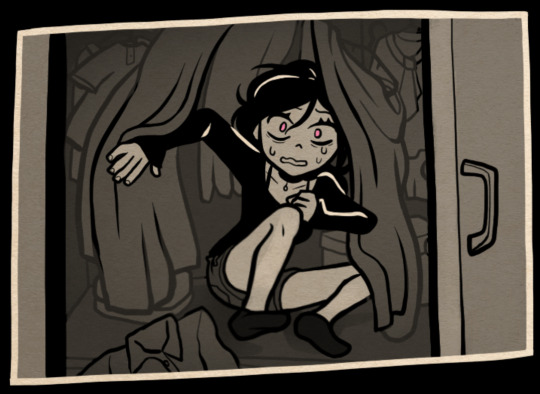
And her expression afterwards?
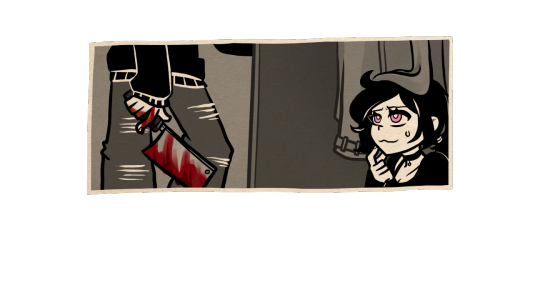
This is not the look of someone who enjoyed the fact that someone killed for her sake. This is not the look of someone who finds joy to be had in violence. It's not even the look of someone who is apathetic towards violence. It almost seems to express shame or guilt, but at the very least, she's timid over it. At the very least, it's an "oh shit, he actually had to do that for my sake" face. Not a "haha, I am making him worse!" face.
Not to mention, not only does Andrew kill the first Warden without a care in the world, he proactively kills the 302 lady to eliminate all witnesses, and because he believes Ashley would want him to. But Ashley actually grills him for it; she didn't want the 302 lady to die, although she hardly had good-person-reasons for it. But that's not my point. The point is that she is not the violent one between the two of them.
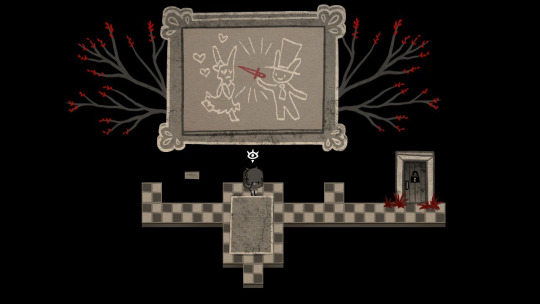
The door doesn't open in response to violence, remember?
The game intentionally misleads us.
And what happens when Ashley tries to make him take responsibility for all this violence? To point out that she didn't force him to do anything and that he chose to do all of it, including lock Nina in the box? She lashes out, hits him a few times… and then he goes to strangle her, and doesn't let go until she acknowledges that he has no reason for her to be around. He literally doesn't cease his threat to her life until she acknowledges she's useless to him.
I acknowledge that this isn't the most charitable framing for Andrew, and maybe too charitable for Ashley. After all, she wasn't indignant. She was mocking him. She found it hilarious. But I have reasons for that charitability that I'll go over towards the end. But even with that charitability in mind, I don't think my reading is too off base. Defaulting to laughter or mocking in stressful situations is just what Ashley does. She's not indignant about it; she just finds it hilarious that people keep pretending to be better than her, when they're not.
Andrew killed the 302 lady and used Ashley as a scapegoat to justify it; this is indisputable, stated in the text during the dream. This alone validates Ashley's point of view. There is no interpretation of this event that doesn't paint Andrew as every bit as unscrupulous as Ashley, and thinking she corrupted him into this- when it was both one of the first actions he did on his own in the story and something he explicitly uses Ashley as a scapegoat for- is just ridiculous. It's frankly unreasonable. She has every right to be sick of being used as a scapegoat. And at the very least, whether or not you accept the idea that Andrew only let Ashley go once she acknowledged that she's useless to him, he's still so taken aback by his misinterpretation of Ashley's desires that HE goes to strangle HER.
This is NOT Andrew triumphantly standing up to his abuser. This is both of their masks slipping; Andrew revealing how violent and insistent on keeping up his internal narrative that he is, and Ashley revealing that she's getting tired of being blamed for everything.
And then, when he finally lets her go… she hugs him, and acknowledges that she's happy that Nina is gone, which makes little sense at the face of it. Why would that be her first response to being let go, when it was ostensibly what made Andrew so upset to begin with?
I think, to her, it's a conciliatory gesture. As chapter 2 showed us, she's more than willing to take responsibility for violence to relieve Andrew of stress over it, as evidenced by her finishing off their parents. This is an earlier instance of that; by acknowledging she was happy that Nina was dead, she took responsibility for it. She willingly framed herself as a bad person here, so Andrew wouldn't have to be.
She let herself be the scapegoat, because it's all she ever knew. She put the mask back on.
This alone is enough to challenge the idea that Ashley 'corrupts' Andrew in any meaningful way. How, exactly, can you define it as corrupt when society itself is twisted enough to force these actions to survive? In a more sane world, a lot of their actions would've been bad, sure, but they're also actions that the siblings probably wouldn't have done in a more sane world. Ashley's actions aren't making Andrew worse, they're helping to ensure their survival. You could say that this is still corruptive in its own way, but at that point it seems like your reasoning is motivated by having already had that narrative rather than making a good-faith reading of their dynamic.
At no point did she actually make him worse; he was already like that and just used her as an excuse.
Next up is the Nina situation. This one is obviously cut and dry- Ashley manipulates Andrew into killing Nina because she wants no competition between the two of them. It's not Andrew's fault and Ashley was an evil abuser from the jump. Obvious, right?
No. It's really not.
It's pretty strongly implied that Ashley was mistreated by people her whole life. The Lemon Cupcake scene shows this in more detail, about how people always neglect or ignore her birthdays, but she also says that nobody likes her because she's weird and loud in the Nina flashback too. But unless something big happened in between the two flashbacks, none of this behavior indicates particularly maladaptive or even strange tendencies on Ashley's part. She's a needy, bratty child, and the closest thing to a friend she has- Nina- wants to take away the one thing from her that's a source of comfort and emotional validation.
It's not entirely rational, sure! But it also -makes perfect sense-. NOBODY treated her well throughout her entire life; it's strongly implied that Nina never did either, given Nina's reaction to Ashley being there and the lower left-hand painting past the Questionable door showing her being distant from the two of them. We can also see a star bouncing off of her head, and stars represent closeness in this game, so it shows there was an attempt made somewhere along the line, it's just not clear as to who made the attempt.
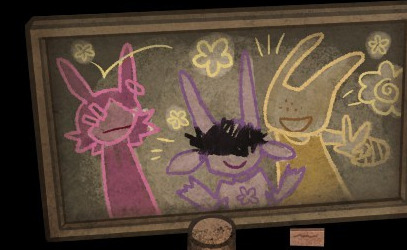
At the very least, Nina's reaction of disappointment fed into Ashley's preconceived notions of how people treat her, and how she deserves to be treated. Although, from what has been directly stated, rather than implied, Nina was nothing more than an innocent victim in this scenario; I don't mean to take that away from her.
"But she didn't care when Nina died?"
So? If Nina treated her like trash for most of her life, why should she care? She didn't expect Nina to die. It was just an acceptable consequence. You can say "That's not how normal kids act!" all you want, but there's a level of spite and apathy that comes with intense bullying and emotional neglect that I don't think you really understand unless you've been there to the extent someone like Ashley has implied to be.
Andrew, meanwhile, was the one who told Ashley that they had to lock Nina in the box to keep them in there. He's the one who looked for and found the stick to keep them locked in. You could say he was coerced by an abusive person into hurting someone, sure, but you'd be wrong. Cataclysmically wrong, even. Like, if you actually think that a seven year old girl (nobody wears overalls past the age of seven) can have anything approximating an abusive dynamic with her as the perpetrator with someone both older and stronger than her, you frankly have some issues with women you need to work out. That's simply not how abuse dynamics work at that age.
Andrew wasn't entirely responsible for it either, mind- he was just a kid who should never have been saddled with this kind of responsibility. But that's not my point; the point is that it enables other people, Andrew included, to use her as a scapegoat to avoid his own responsibility. All this scene does is retroactively justify any preconceptions you might've had about them from seeing their adult selves first. But the moment you start digging, it becomes much less obvious who's really culpable here. Andrew was, as evidenced by the blood oath scene, fully aware that he held the advantage over her in strength, and managed to give up nothing when making the oath while he made Ashley swear to silence. He was fully aware that he could've chosen to do better, but he refused, and instead opted to reinforce Ashley's insecurities for the sake of exerting control over her.
I've said before that the 302 lady was murdered without any input from Ashley, but this is also relevant on a meta-level because it's done without any input from the player, either. Both of the murders in chapter 1 were like that, whereas all that we, the player can choose to do in that chapter is either solve puzzles, or hilariously, die. The only person with control here is Andrew, the character, and this is reinforced by the fact that we have no control over him for much of the Nina flashback, too. He locks her in the box regardless of our input, even though Ashley spends a lot of time trying to convince him. The main difference between the Nina flashback and the scenes in the apartment is that Ashley had absolutely no idea that any of that was going to happen in the present, whereas it's something she wanted with Nina- which isn't that big of a difference when discussing how much agency she really has.
As much as the game frames Ashley as a manipulator- and much of the fanbase uncritically accepts- she is given shockingly little in-game control over many of the actions committed. Even in the case of the Hitman- as a good friend of mine pointed out- the only choice the player is given is whether or not to check the closet and be killed; an impulsive decision leading to a swift and unceremonious end. In the end, Andrew is the one given the choice to kill the hitman, and we can consciously choose whether or not his reaction is panicked or measured. No such choice is given to Ashley, as most of her reactions are impulsive and spontaneous rather than planned. This is not the makings of a standard "manipulative evil bitch" trope. She's pretty consistently portrayed as someone with poor impulse and emotional control who loudly and aggressively states her intent in every single scenario she's in.
And you can still call what she says and does manipulative despite that, sure, but at what point are you just pathologizing relatively normal (if extreme and highly emotional) social interactions for the sake of fitting into a narrative you already held?
We see Ashley's status as a scapegoat for people to use to pretend to be normal reach its most blatant with the parents. This time it's pretty cut and dry to anyone that doesn't already have it in their mind that Ashley is evil and unforgivable. Mrs. Graves explicitly brings up the possibility of a normal life without Ashley to Andrew in the basement, and claims that Ashley was at fault for shutting her out. She would've been a normal parent otherwise, right? Well, no; the game wastes no time in showing that this wasn't the case in the Burial ending.
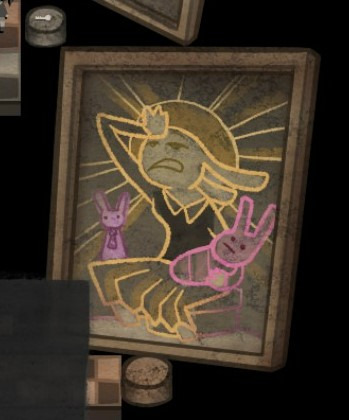
From when Ashley was a baby, Mrs. Graves was already tired of her shit, and too emotionally exhausted to be a parent. Despite her attempts at blaming Ashley, she would've never been a normal parent unless Ashley was a golden child in the same way that Andrew was. And yet Ashley didn't even deny shutting her mom out. She didn't deny the chance to be used as a scapegoat; it was all she ever knew. The fact that Mrs. Graves had the audacity to claim that she was a saint when she was never prepared to be a parent for a child who didn't make it easy, and when she was willing to sell out her children and let them die for a life insurance payment is absolutely astounding.
This alone should've been enough to recontextualize everything we supposedly know about how responsible Ashley really is in all of this, but bad parents have a knack for being great at manipulating both family members and everyone viewing from the outside, including the people playing the game.
And almost including Andrew.
Andrew almost accepting the mom's offer is the single most tragic moment in the game, by far.
Dandy said it best in his video essay: By Ashley leaving Andrew alone with their parents, she showed that she is capable of changing. That she is capable of getting better. She showed that she loves and respects Andrew enough to be able to put aside her usual role as the scapegoat and allow him to make the decision that was for the best for both of them. And make no mistake, it was for the best; if the mom really DID sell out the siblings, and given the two of them were already on the run for supposedly being dead, there was no hope of any of this ever working out. They saw through the conspiracy and knew the truth of how the quarantine operations really worked. They were an active threat to one of the most powerful entities seen in the setting so far, to the point where they had a hitman sent after them.
Mrs. Graves had every reason to sell them out again, for their presence in a public setting was more than enough to put everyone in their family in danger. Mrs. Graves had every reason to believe that the normalcy she wanted was nothing that could ever be grasped again so long as her children were alive, and as such, it was clear that she had nothing to offer either Andrew or Ashley. Ashley trusted Andrew to see through their obvious manipulations and lies, and understand that the parents had nothing left to give them. She trusted him to love her more than the false promises their parents could give.
…And yet.
In spite of it all.
In spite of her love, in spite of clearly displaying that she can grow up and become a person that causes him less stress, and in spite of Ashley showing that all she wants now is their safety and security…
Andrew can still choose to consider Ashley the problem. He can still choose to use her as the scapegoat he always has.
He can still choose to see her as the one thing that caused him to be this way, that stands in between him and normalcy, when she, not once, forced him to do anything.
Were he to accept Mrs. Graves' offer, this would've been the single most tragic moment in the game. It almost was, and still stands to be, because he ignores every indication that things could be better for the sake of his own narrative, and a narrative echoed by much of the fandom.
But no matter what ending was picked, things could be better. They could've been better all along. Compared to chapter 1, their dynamic in chapter 2 is already much healthier. Their banter is less venomous, and while they still poke and prod each other in ways that aren't exactly great, they don't get into the same violent fights we saw in the 302 room. By all accounts, what happened in that room was an outlier. Even when they find themselves in their parents' house, where they stand to do the One Thing That Means They Would Never Be Normal Again, Ever (ignoring the fact that this is already a lost cause by then), Ashley doesn't get into any fights with Andrew in the same way she did back in the apartment. All she wants is affirmation and security. She doesn't even lay into her mom like she lays into Julia over the phone, even in their private conversations.
We’re led to believe that she’s still getting worse because the actions she’s taking are more extreme, but her attitudes and behaviors are much, much different. The actual actions they're taking are so obviously the right thing to do (both morally and practically) that I don't think it's until they eat their parents that you should make a double take and go "Wow, maybe these goblins actually are kinda fucked up," because until then, well… everything is justified! Perfectly so! Even then, eating their parents serves a purpose, even if not a mentally healthy one.
Maybe she’s calmer because she’s in control over the situation, but if the calls she made to Julia are any indication (independent of the theory that she didn’t actually say those things), were she unchanged as a person, she still would’ve lashed out at their mother over how much more useful she is to Andrew than their parents were, or something of that nature. Something about how nothing their mom offers could compete with what Ashley gives. But she makes no such claims. She feels no need to prove anything to her parents, or to reaffirm her place in Andrew’s life even in the face of her mother challenging it (or at least implying such a challenge). Regardless of her insecurities, she’s changed. It’s hard to see, but she has.
And then Andrew can ignore that and consider betraying her because he refuses to believe that she's willing to make their dynamic work, when she shows many different indications of being willing to concede as long as Andrew stops giving her mixed signals.
A friend of mine put it best, and I'm pretty much quoting her word for word here, because of how strongly I agree with it. When I look at Ashley, I find very few actual "flaws." I see familiar wounds.
The Burial ending, despite being triumphant and not nearly as "dark" as some people think, is still very, very sad. A lot of abusive dynamics are characterized by someone having to fight every step of the way to get what they need from the other person, usually some kind of emotional validation or relief. This is what happens between Andrew and Ashley for most of the game: Ashley wants Andrew to treat their relationship as special, to acknowledge there's something to it beyond just him going through the motions. And yet for most of the game, he refuses to, especially in chapter 1. And then, in Burial, when he does…
She's confused.
A lot of people view this as her being afraid of losing control over Andrew, since her "Andy," who she can push around, is gone. Andrew has changed, and the same tricks wouldn't work. But that's not what that is; it's not about control, it's about her finally getting what she wants from him without having to fight. She still thinks about using sex as leverage to keep him around, but that's because she's never understood what it's like to have someone actually want to be around her. And I speak from experience; when you no longer have to fight for every little bit of emotional validation or relief, when you no longer have to keep checking your messages to keep an argument going so you can finally be proven right, when you no longer have to force yourself to let go, to stop engaging, the reaction isn't happiness. It's not relief.
It's confusion. It's discontent.
Because something you've tied so much of yourself up in to is no longer there, despite it being more peaceful, it still feels wrong. The dynamic still has to be this way in your mind, because you've never known anything else. You latch on to whatever you can in order to justify that, and your actions are still heavily biased in favor of maintaining your place in that nonexistent dynamic. This isn't manipulation; it's trauma. And the fact that Ashley almost immediately understands that Andrew is changing is nothing short of a miracle. By consolidating past and present Andrew into a single person rather than splitting them into two, she showing that she can actually heal from that trauma. And all Andrew had to do to enable this is to acknowledge that she CAN change, that things CAN be better, and that everyone who claims to be better than her is full of shit.
I've analyzed the events of the story in a way that may seem needlessly antagonistic to some characters, and overly charitable to others. But I have to ask you, that if you disagree with anything I've said:
Where does that disagreement come from? What about my narrative clashes with your own? -Why- does it clash? Is it because the game presents your interpretation as obvious, whereas mine is not? Is it because you've experienced someone like Ashley before in your life, and you know it when you see it? Maybe you strongly identify with Andrew, and view his status as a doormat with no agency to be obvious? Or did you just accept the narrative that much of the fanbase has taken at face value, without further analysis other than building on top of it?
I don't believe these things to be contrarian; I've held most of these opinions since my first or second playthrough. I don't believe what I do because you don't, I believe what I do because I understand what Ashley has been through. I've experienced a lot of the specific traumas she had, such as deep feelings of isolation and being deprived of the emotional validation I need from the people who need to give it. I know what it's like to be misunderstood, to have who and what I am taken for granted, and to be terrified of being abandoned by the people I need the most. I see what I do because I understand.
And I want to give her that understanding that nobody gave me.
Maybe you should think about it. Why do you take it for granted that Andrew is a doormat who is strung along by Ashley? Why do you find it so odd when the trope of a woman corrupting a good man through leveraging sex is drawn into question? Why is Ashley seen as crazy, when all of her actions are so straightforward and rational? How is she corrupting him, when the single most needlessly violent act in the whole story- outside of the Nina flashback- is done without her influence? Why is Ashley seen as the abusive one when Andrew both threatens and resorts to physical violence and witholds emotional validation?
Weirdly personal tangent aside, Ashley and Andrew are two of the most well-written characters I have ever seen. They're not written like archetypes who interact with each other through a series of tropes; they're written like real people who's words and actions have astoundingly human motivations. They come from places that we can understand and relate to.
And just like people, they deserve respect. In spite of all they've done, they deserve love.
But make no mistake, Ashley is not the one stopping that love from happening. She just has the audacity to still want it in spite of everything telling her that she doesn't deserve it. We're led to believe she wants too much, but all she ever wanted was the bare minimum that she was never given.
And she has every right to be mad about it.
165 notes
·
View notes
Text
"No piece of media is perfect. Everything has fla-"
[INCORRECT BUZZER NOISE] WWWWWWWRRRRRRRRRROOOOOOOOOONNNNNNNNGGGGGGGGGGAH

125 notes
·
View notes
Text
Seeing the person who literally inspired me to write TCAL essays and treat the game as the narrative masterpiece that it is write something like this is like an early Christmas present.
Transfems are trying to disempower afabs not so that amabs and afabs have equal group powers in queer/progressive/leftist contexts, so that there is no longer domination by any agab, but they are specifically trying to establish amab domination and therefore subjugate afabs because they fear that if afabs are not under amab control they will almost inevitably reconstitute themselves as a terf political force, and therefore reproduce transfem oppression.
The subjugation of afabs to amabs is therefore seen as a way of minimizing the risk of the terf threat, a way to keeping it under control.
You have to get it into your head that transfems see afabs, whether cis, trans or non-binary, as a terf threat.
77 notes
·
View notes
Text
"Friends dont look at friends that way" COWARD. I look at my friends with awe in my eyes, my chest is filled with love, im glowing because i get to be near my friends. I look at my friends and i would give them my everything. SO SKILL ISSUE, look at your friends with all the love that you have
46K notes
·
View notes
Text

90 notes
·
View notes
Text
there is little worse in this world than people being horny for your favourite character that you are not horny for. shut up about his dick i wanna talk about his narrative significance
31K notes
·
View notes
Note
We know where Ashley’s issues come from, but what about Andrew’s fear of consequences? I suspect it’s linked to him being an “easy” kid to his parents.
I think his fear of consequences just comes from the fact that almost every thought in his brain revolves around Ashley and the risk of getting separated from her. It's reasonably likely his entire moral core mutated around his relationship with her, assuming it could even be called morality to begin with.
16 notes
·
View notes
Text
I've said this before, I'll say it now, and I'll keep repeating it, but the most telling thing about her mental health is how she reacts to the Burial route: anxiety, hints of self-reflection, and no fictionalized self-reinforcing psychosis. Immediately, she shows signs of being able to heal and that her problems aren't just some plot device.
It's remarkably human; nothing extreme or unbelievable about it. The story makes a lot more sense if you treat the Graves siblings as people and not a mental health case study.
i’ve seen some people say that ashley is kind of an extreme portrayal of mental illness(es), but, from my own experience…. she’s actually a very real portrayal. all of her possessiveness, her mood swings, her dependency on andrew, her choice to not think too long about super traumatizing shit, her impulsiveness; all of those are very normal, very accurate ways mental illnesses and other disorders manifest
(andrew also shows Many signs of mental illness(es) and disorders, and so does their mom, but that’s not what this post is about!!)
i’m not going to try to diagnose her or anything, and i’ll try to keep my headcanons to myself, but i believe we can all tell that the way she thinks and acts is not exactly healthy for her or the people around her. she’s harmful to herself, andrew, and a lot of others. there’s genuinely So Much that has influenced the way she is, i kind of don’t even know where to start
she wasn’t “born evil,” like her mom says. she isn’t even “evil,” she just… doesn’t really understand. that’s not a bad thing!! she doesn’t understand what’s wrong with her behavior, because no adult ever taught her. no adult ever cared enough to make sure she learned how to treat people nicely. no adult ever paid attention to her harmful behavior and tried to correct it. we see that ashley has been kind of an asshole from a very early age, and she’s always been pretty blunt with her thoughts and feelings. she hasn’t ever felt the need to sugar-coat things, to spare other’s feelings. aside from andrew, nobody has ever been genuinely nice to her, or spared her feelings, so why should she bother?
similarly, she doesn’t lie too often, unlike andrew. she doesn’t like pretending, especially not with him. she says in game, during dinner with their parents, that she can’t “keep up” with andrew’s lies. we only really see her lie of her own accord once, and she doesn’t donit very convincingly.
she doesn’t really care about anything that doesn’t concern her or andrew, which is like. The Most logical path for her feelings to take. andrew is the only person that she’s ever known who cares about her. he’s been by her side for her entire life. her parents, her neighbors, and her friends have done wrong by her, and have been driven away by her… Her. except for andrew. (we’re ignoring the chapter two decay route for this). he’s been there through everything. he’s cared when no one else has. he’s seen her at her worst and her best moments. again, no adult taught her about caring, or pretending to care. she doesn’t feel the need to mask like andrew does, and she doesn’t have a want to “fit in” to a society that has failed her and her brother. she’s been treated as an outsider for her whole life, so she probably believes she’ll never “fit in,” she’ll never be accepted, and she doesn’t need to fit in or be accepted by them.
she greatly values loyalty in her friends. we see her act this way with andrew, with nina, and with julia. she sees people chosing others over her as a betrayal. other than andrew, no one has ever chosen ashley first. that upsets her!! that would upset anyone, but it especially upsets her because no one has ever chosen her first. her parents gave andrew all of their attention, but not her. her two friends have betrayed their friendship and put andrew above her. in game, she says it herself: she should be the top priority. with every encounter, every back-and-forth, every relationship, every decision, she’s waiting to be pushed aside. she’s waiting to be discarded. with andrew, she’ll do anything in her power to make sure he doesn’t leave her, either.
i think that it’s really interesting that she really is her worst self with andrew. she’s mean, she’s violent, she’s petty and crass and acts very childish, but she generally feels safe with him. she feels comfortable with him, and doesn’t feel the need to hold herself back at all. there’s security to be found in a relationship (of any kind) that you can say terrible things and act in horrible ways and that person stays by your side. that’s a huge part what she has with andrew. she trusts him to stay by her side, despite how awfully she may act. she places a Lot of importance on his presence in her life.
even the murder and cannibalism can be attributed to mental illness (along with The Plot). the intense mood swings that she has go along with her already violent tendencies. she feels anger, frustration, annoyance, and a whole bunch of other really negative emotions that she’s never learned to cope with. a lot of people in real life use violence as an outlet for anger. plus, she doesn’t allow herself feel upset or disgusted by death, even at her own hands (if she even feels it at all). despite that, i believe that murdering her parents had to be So cathartic for her and andrew. ashley explains in the decay route why eating people makes her feel powerful and in control, and being in control is something she very obviously feels that she lacks. she’s seen as manipulative, but she doesn’t really succeed at her manipulation. she’s understandably insecure with her entire existence, so she tries to control whoever and whatever she can, and that extends to andrew, murder, as well as cooking and eating people
there’s a lot to life that is treated as “normal” and “universal,” but everyone starts with absolutely no knowledge. experiences build a person’s worldview and shapes their personality, and ashley has had very rough experiences. she is a product of abuse and neglect and mistreatment, and is a very realistic depiction of a person who has had the experiences she’s had. the game has a pretty light tone despite the content, but it being “pretty light” doesn’t take away from the amount of detail that is put into the main characters and the trauma that they’ve suffered
ashley doesn’t have to be “good” or “positive” representation to be accurate representation, and i feel like nemlei has done a fucking excellent job at making a very, very unwell person (or two or three) in a very, very unwell society, and i am so extremely excited to see more of the graves’ childhood in chapter three
84 notes
·
View notes
Text
reblog to give the person you reblogged it from a little heart lollipop

130K notes
·
View notes


